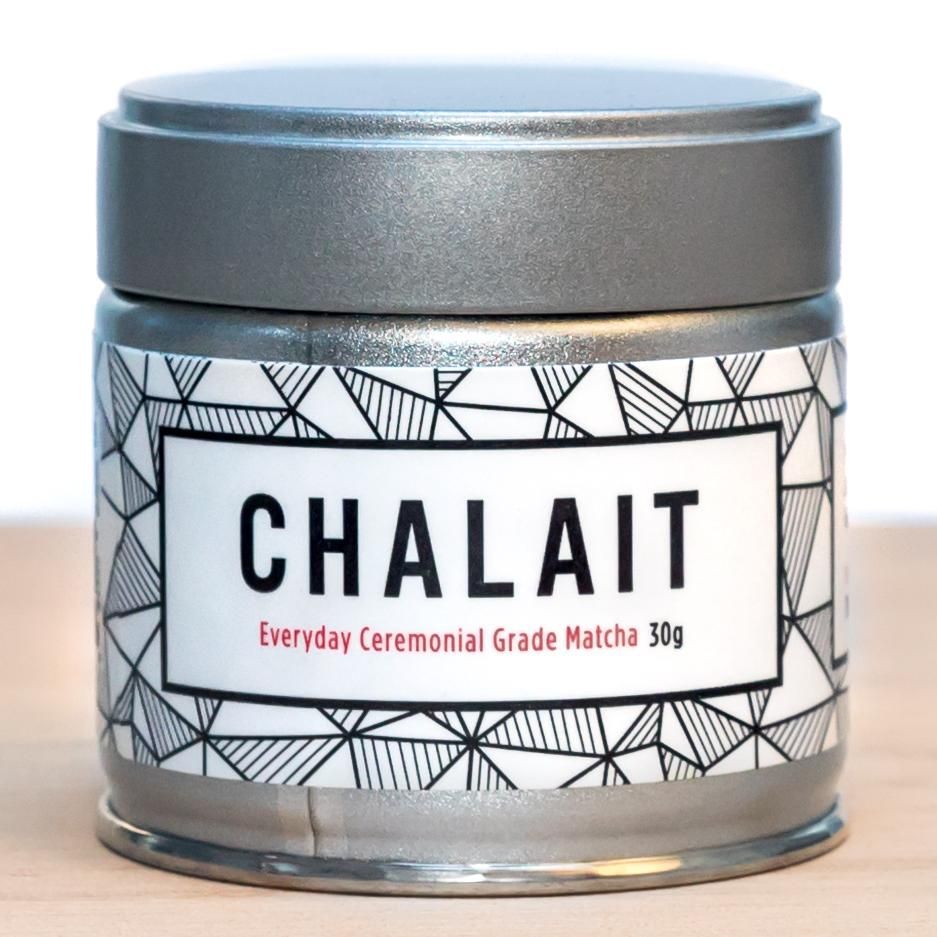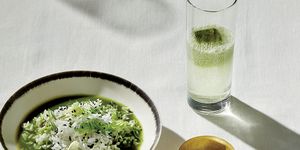If You Haven't Switched To Matcha Yet, You Are Seriously Missing Out
Over the past few years, matcha has become such a popular drink that you’ll find it offered at almost any coffee shop across the country. And unlike most food trends, matcha has maintained its cult wellness status—which means it’s time to get to know exactly what matcha powder is and its good-for-you benefits.
Matcha is part of the green-tea family, but it’s a unique member. Unlike traditional forms of green tea, where you steep tea leaves in water to create the drink, matcha is the powder made from the actual tea leaves, just ground up. Because of this, when you consume matcha, you’re getting a higher concentration of the leaves’ nutrients. Translation: more benefits. These are some of the matcha benefits that might convince you to stock up on the grassy-tasting tea:
1. It’s loaded with antioxidants.
Green tea contains a type of antioxidants called catechins, as well as another group, polyphenols. “Matcha powder offers a megadose of these powerful antioxidants, which can help reduce cell damage and prevent chronic disease,” says nutritionist Jenna Gorham, RD, founder of Jenna Gorham Nutrition Consulting in Bozeman, Montana.

2. You’ll get more energy than you would from other teas.
Matcha powder has about three times the amount of caffeine as alternative types of brewed teas, says Gorham. That’s about the same energy benefit—or slightly less than—a cup of coffee (different coffees have different levels of caffeine).
3. You won’t feel as jittery as you might from a cup of joe.
“Matcha powder contains L-theanine, an amino acid that has been shown to reduce stress,” Gorham says. One 2016 study found that drinking a beverage rich in L-theanine can be extremely effective for those with high anxiety. “People say that when they drink matcha, they have a smooth alertness and don’t experience a ‘caffeine crash,’ which could have to do with the L-theanine component,” Gorham adds.
Feeling stressed? Try this yoga pose for instant zen:
4. It can make you significantly more productive.
In a 2017 study published in Food Research International, people who drank matcha tea specifically (not just plain old green tea!) experienced an increase in attention and processing speed an hour later—likely due to a trifecta of L-theanine, a major polyphenol called epigallocatechin gallate (EGCG), and caffeine. So on your busiest workdays, splurging on a matcha latte (which can be upward of $5, if the matcha powder is good quality) might just be the perfect investment.
5. It could help ward off cancer.
While there’s no specific research proving the anticancer benefits of matcha powder itself, scientists have been reviewing green tea as a category for years. Study after study has linked the powerful antioxidant EGCG to cancer prevention, especially of colorectal types (but also breast, prostate, and lung). Apparently, the compound might inhibit cancer cell growth by inducing apoptosis—a.k.a., killing malignant cells.
6. It may promote healthier cholesterol levels.
EGCG strikes again: A 2016 review of studies concluded that, thanks to this compound, consuming green tea can result in a serious reduction in bad cholesterol (often called “LDL”). LDL is the type of cholesterol that leads to a buildup of fatty acids in the arteries, which some experts say increases your risk for heart attack and stroke.
7. It can strengthen your bones.
Most people don’t think about actively taking measures to build bone strength, but it’s important for your fitness and mobility, especially as you age. Green tea may increase bone mineral density (as in, how solid your bones are), in turn lowering your risk of developing osteoporosis, according to several studies. Don’t overlook this benefit.
8. It can be more filling than a cup of coffee or brewed tea.
Matcha powder has a strong, earthy taste, so it’s most often whisked and served with milk or a non-dairy alternative, like almond or oat milk. Because of this, the drink tends to be as satiating as your average espresso-based latte. But note that “some coffee shops and restaurants might use a mix that has sugar and/or powdered milk to balance out the earthy flavor, which makes it less healthy than straight-up matcha powder,” says Gorham. Ask your barista if they use actual matcha powder or a pre-made mix, and if the latter, what’s in it. “Non-dairy milks might be sweetened too, so just be conscious of how much sugar you’re consuming, as that can overpower its benefits,” Gorham adds.
9. It works really well as a natural food dye.
There’s some research suggesting that artificial food dyes (you know, the kind you baked with as a kid) may be carcinogenic (linked to cancer) or cause “hypersensitivity reactions.” Which is why when there’s an opportunity to color food using natural sources, you should take advantage.

Quality matcha powder is grown in the shade versus instead of under the sun in order to force the leaves to overproduce chlorophyll, according to Japanese matcha brand BeMatcha. The OTT chlorophyll content is what gives matcha powder its rich green color—and that color will take over pretty much anything it’s mixed with. So for baking, cooking, and even cocktail-mixing needs, add a little matcha powder for a naturally green (and nutritious!) treat. Something to remember next St. Patrick’s Day…and whenever you want to impress people at your next dinner party.
Source: Read Full Article


